Making sense of the markets this week: October 1, 2023
Meme stocks continue to capitulate, giving context to Canadian housing, and two questions: Should I worry about the U.S. government shutdown? How much is Taylor Swift worth?
Advertisement
Meme stocks continue to capitulate, giving context to Canadian housing, and two questions: Should I worry about the U.S. government shutdown? How much is Taylor Swift worth?

Kyle Prevost, creator of 4 Steps to a Worry-Free Retirement, Canada’s DIY retirement planning course, shares financial headlines and offers context for Canadian investors.
A few months ago, we wrote this about this U.S. political mess:
“This could lead to higher interest rates (for investments and borrowing), a fundamental reassessment of investment risk, a loss of trust in the United States on the world stage, and basically complete economic chaos. […] Millions of people will lose their jobs, the value of your portfolio might be cut in half, and it’s quite likely the world’s economy would completely seize up in an event akin to the Great Depression.”
And, again this week, dominating headlines are about the ever-increasing chaos of U.S. politics and an accompanying probable government shutdown.
So, why aren’t we worried?
The key difference with this time lies in how the two situations pertain to financial markets.
It’s obviously not great for businesses if the government shuts down (less money to spend, a general sense of pessimism, and so on). But the good news is that no matter what happens with this most recent U.S. government debacle, bond holders of U.S. debt will continue to get paid.
Because U.S. bonds are the cornerstone upon which much of the world’s economy is built, the default (a.k.a. the failure to raise the debt ceiling) that was threatened back in May was quite scary. The spin-off effects of U.S. bonds being defaulted on are almost unimaginable.
On the other hand, a simple wrench in the gears of everyday government life may be a real pain for many Americans, but it’s not likely to affect world asset prices much. Businesses and governments around the world will continue on largely unimpeded.
As we go to press it looks increasingly likely that the U.S. government will shut down. But given how frequently shutdowns have happened recently, it seems the markets are taking it in stride. Even the U.S. dollar is showing remarkable strength in the face of a shutdown.
We think, in the long run, the USA’s simmering political tensions represent a real threat to economic stability. But a government shutdown that lasts a week or two shouldn’t be something to get overly concerned with at the moment.
Canada’s former wunderkind, BlackBerry (BB/TSX) announced earnings (or rather lack thereof) on Thursday. Losses per share were USD$0.04 (which was better than the loss of $0.05 per share that was predicted), and revenues were also disappointing at USD$132 million (versus 146.95 million reported). The share price was flat in after-hours trading.
It has been a fairly steep decline for the folks who bought into Canada’s contribution to meme stock mania back in 2021.
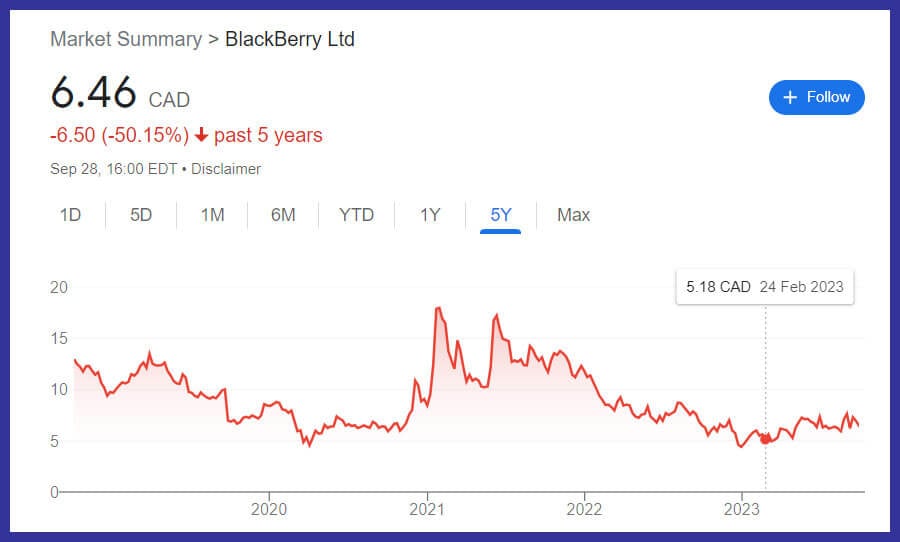
On the other hand, the original meme stock, GameStop (GME/NYSE) briefly made news on Thursday when its stock surged 10% in the aftermath of activist investor Ryan Cohen being named CEO and Chairman. Of course, in true GameStop fashion, the stock came down just as fast as it shot up.
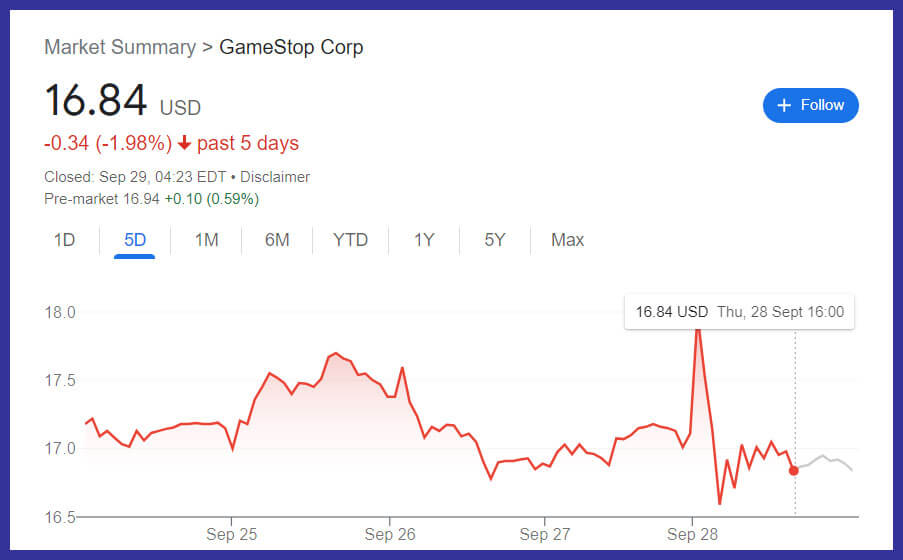
While Cohen rose to fame on the back of his success with Chewy.com, he wasn’t able to replicate the magic with now bankrupt Bed Bath and Beyond (BBY/NYSE).
Just a quick reminder: GameStop hasn’t actually posted an annual profit in over five years.
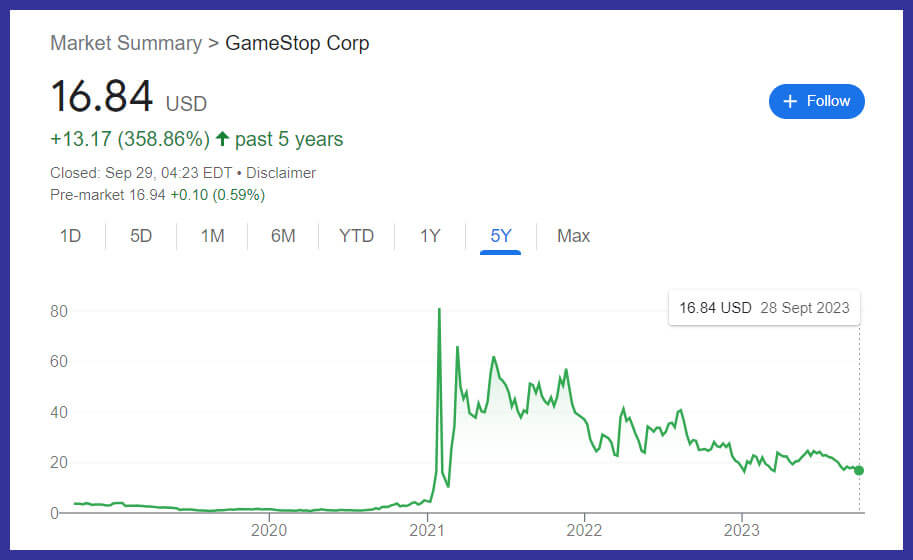
If there is one thing that Canadians of all ages and backgrounds can agree on, it’s that we all need to talk about the housing market. I like to call it— tongue in cheek, of course—“Canada’s National Religion.” There is certainly something worth discussing when you look at graphs like these:
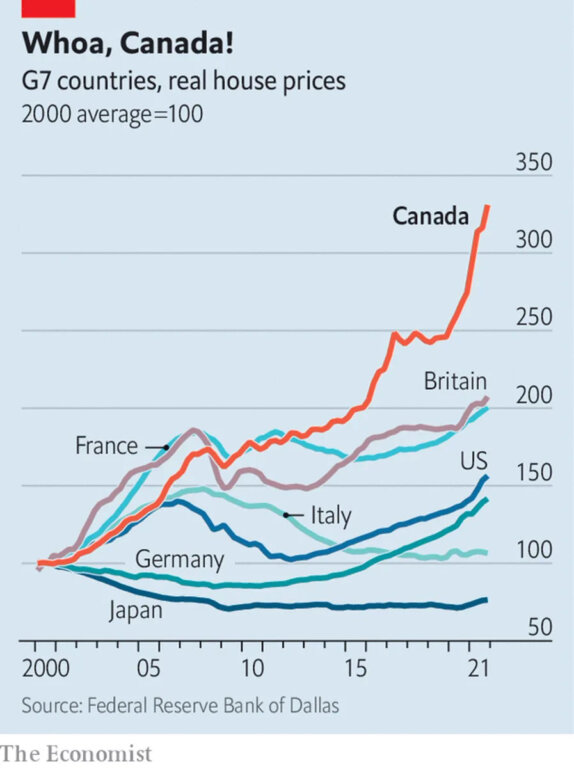
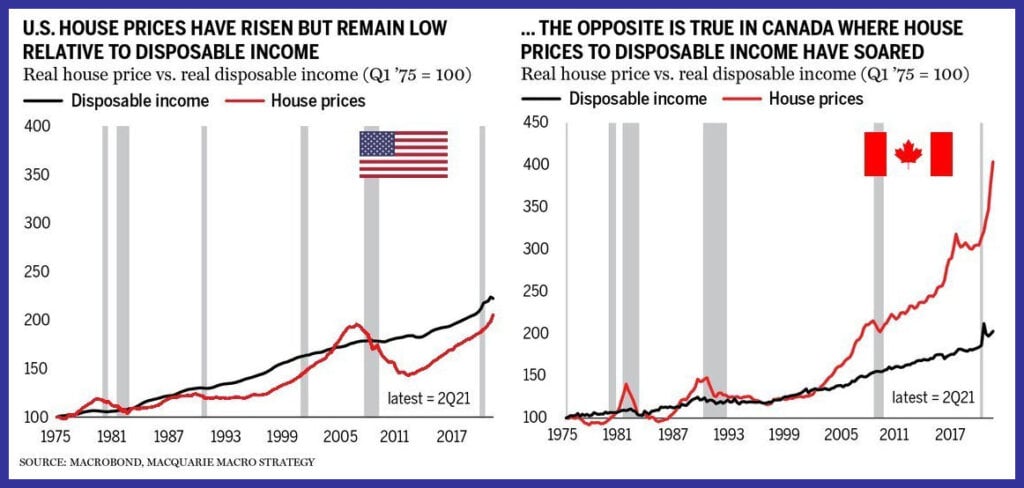
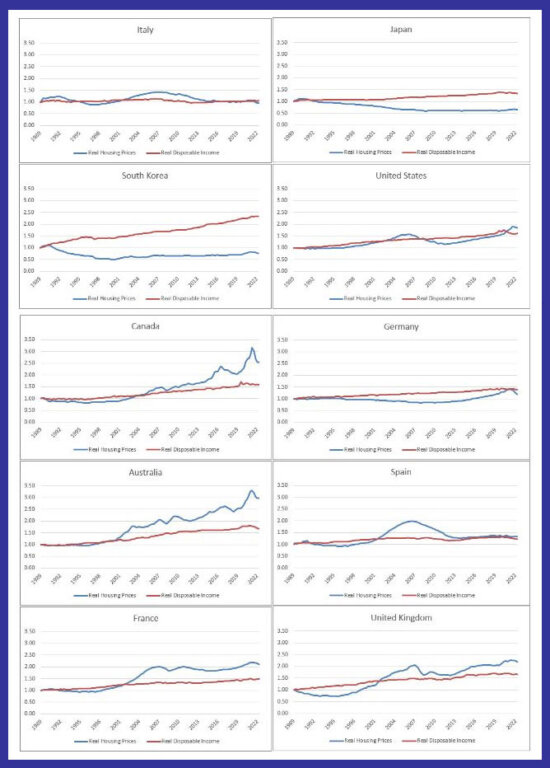
The housing crisis may actually have gotten salient enough to do the unthinkable: Get Canadian politicians to respond. On the heels of polls showing that Conservative leader Pierre Poilievre’s message around the cost of living in Canada is breaking through with younger voters, politicians of all stripes are announcing their plans to help Canadians buy their dream houses.
The thing we might be skipping over here is that their dream houses probably bear little resemblance to that of their parents’ or grandparents’.
Generally, when we see attention-grabbing headlines and charts like the ones above, they’re in reference to the average cost per home. Those statistics don’t take into account how the average house has changed over the years.
Bottom line: We like larger fancier homes than the Canadians of yesteryear did.
Here’s what I’m talking about. These are American statistics, but they are comparable to Canadian preferences as well:
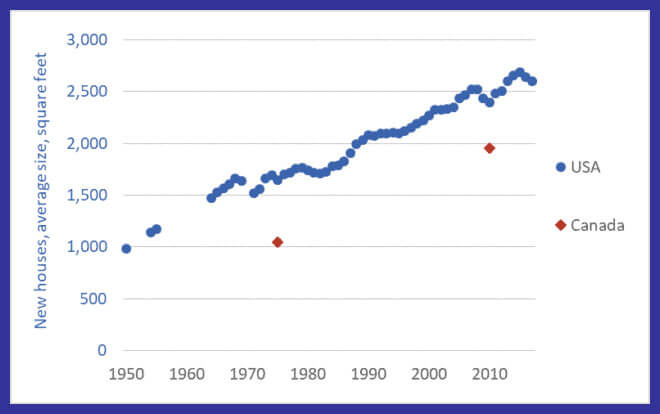

Size captures only one aspect of why homes are so much better today than they were decades ago. Here’s a brief summary by Ben Carlson of the advantages of homes today. Again, this is based on U.S. data, but it can be considered broadly applicable to Canada.
| Home features | 1973 | 2022 |
| Air conditioning | 49% of homes without AC | 7% of houses without AC |
| Bathrooms | 40% of homes had 1.5 bathrooms or fewer | 4% have 1.5 bathrooms or fewer |
| 3 Bedrooms | 64% of houses had 3 bedrooms | 42% of houses have 3 bedrooms |
| 4 Bedrooms | 23% had 4 bedrooms or more | 47% come with 4 bedrooms or more |
| Median space | 1,525 sq ft | 2,500 sq ft |
| Average residents per household | 3 | 2.5 |
Those statistics don’t take into consideration other creature comforts or aesthetic “must haves” that are common in today’s homes, such as expensive countertops and backsplashes, gender-specific “caves,” home offices and picturesque landscaping.
It’s true that housing prices have certainly increased much faster in Canada than it did in much of the world. However, it’s important to contextualize the North American housing stock of today versus that of yesterday when comparing the overall asset class.
I wrote about my thoughts on being a Canadian homeowner on MillionDollarJourney.ca.
I’ve been part of the Swifties since we were both teenagers and she was an up-and-coming country music singer. To my younger readers, this was way before The Rock was singing her lyrics about six seconds into this video.
…and before she cheered on her new boyfriend from a luxury box.
Source: Giphy
So, it caught my attention (there is some precedent here when you consider Bowie Bonds) when the guys on the Animal Spirits Podcast asked:
“If you could buy a piece of all of Taylor Swift’s future earnings potential what would that be?”
What they’re alluding to is basically what you do when buying a stock.
The fellas went on to discuss what Swift’s market capitalization could be if she were a company, and whether she could make the S&P500 as one of the one of the 500 biggest publicly traded companies in the States.
To put this in context for Canadians, I wanted to explore if “Taylor Swift Co.” would make the TSX 60.
Valuing a company is as much art as it is science. I’m essentially asking, how much Canadians would be willing to pay to get a piece of all of Swift’s future earnings?
For comparison, the Algonquin Power & Utilities Corp (AQN/TSX) is currently the smallest company included in the TSX60 index. Its market cap is about USD$4.5 billion. It has more than 3,400 employees and CAD$17 billion in total assets.
So, is “Taylor Swift Co.” bigger than AQN?
Here’s what we know.
So, if we say that the “Taylor Swift Co.” is set to bring in about USD$3 billion in revenues in 2023, not counting streaming income. (We don’t know how much she makes each year from streaming, but it has to be a fair amount, considering what her old albums sold for.)
Then it follows that using a very conservative one-and-a-half times the price-to-sales ratio, Swift’s market cap would be about USD$4.5 billion.
Now, that said, her profit margins are a lot higher than, say, Algonquin or fellow bottom TSX-dweller Gildan Activewear (GIL/TSX). That would mean we could probably boost that ratio a bit. It’s also worth mentioning that the “Taylor Swift Co.” would have no loans, and hence, no sensitivity to higher interest rates (something AQN investors might cherish at the moment).
EqVista.com recommends a price-to-sales for the movies/entertainment industry of 3.68. At that multiple, Swift Co. is worth over USD$11 billion. That not only puts Swift above Algonquin and Gildan, but it would put this hypothetical company well into the TSX60, and worth more than Hydro One.
Yes—“Taylor Swift Co.” could be worth more than the company that delivers electricity to almost all of Ontario’s homes!
While it might be tough to justify that sort of multiple given the fact that Swift can’t tour forever (could she?) and that her revenues will likely go down in the years to come, I would say that if Swift were a company, I would value her lifetime earnings as more than the 60th biggest company in Canada, and consequently she would be part of the TSX60 index.
Travis Kelce jerseys saw a nearly 400% spike in sales after Taylor Swift attended his game, TMZ reports. September 25, 2023
In case you missed it, we released the 2023 speaker lineup for the Canadian Financial Summit this past week. Registering for the Summit is completely free and you can click here for more details.

With so many ETF options available, it can be hard for investors to know what to put into their portfolios. MoneySense’s executive editor Lisa Hannam hosts as journalist Michael McCullough looks at the makeup of the ETF market and will share, based on MoneySense’s ETF All-Stars Report, the ETF products Canadians could consider buying today.
The first-home savings account is brand spanking new, and Canadians have questions. In the similar format of MoneySense’s popular Ask A Planner column, executive editor Lisa Hannam will ask Certified Financial Planner Allan Norman real questions from Canadians about the FHSA, from what it is to where to open this account.
MoneySense executive editor Lisa Hannam and columnist Kyle Prevost work together on the popular column Making Sense of the Markets. It contextualizes headlines for Canadian investors, so together the duo will be looking at the headlines from the year and those to come, including interest rates, crypto (remember that asset?), employment, AI, GICs and so much more.
Share this article Share on Facebook Share on Twitter Share on Linkedin Share on Reddit Share on Email